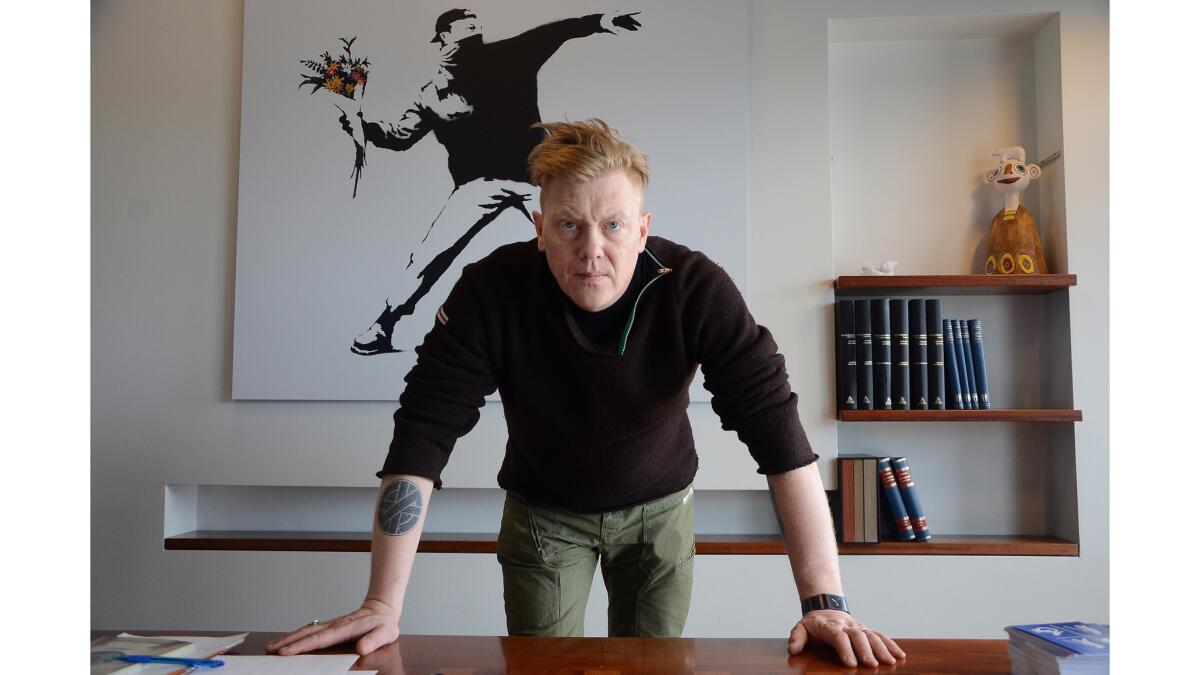As populist movements take hold, Iceland’s Pirate Party offers a glimpse at a more radical future

- Share via
Reporting from REYKJAVIK, Iceland — On the edge of a vast asphalt expanse in this northerly capital, behind a big-box retailer and a car wash, the future of democracy was taking shape.
Or at least so its participants hoped.
“What we think we could do is raise taxes on the wealthy even more,” said Ragnar Hannes Gudmundsson, as he typed on a conference-room laptop, sending bullet points to a projection screen.
“The estate tax should go from 20% to 30%. Doesn’t Finland have 30%?” said Haraldur Ingisson from across the table.
“And we have to take more steps to make sure that government doesn’t control the fisheries,” Olafur Sigurdsson piped in.
The men — six agricultural and office workers, many over the age of 40 — were ordinary citizens drafting legislation as part of a new vision for democracy. They had convened at the headquarters of the Icelandic Pirate Party, one of the West’s most unusual political groups.
With populist movements sweeping the West — the Brexit drive in Britain, Syriza in Greece, the National Front in France and the Donald Trump and Bernie Sanders campaigns in the United States — the Pirate Party continues the vogue to return power to the people.
But compared with those groups, the Pirates offer a far more radical interpretation of the idea: Rather than simply replace establishment politicians with outsiders, the Pirates argue for doing away with chunks of the representative system altogether and moving to a purer form of one person, one vote.
The old system is not totally going to blow up, but we can shift responsibility from the close-knit circle of the political elite to the people themselves.
— Finnur Gunnthorsson, local party leader
Supporters conceive of a world without lobbyists, bureaucrats and career politicians. And imagine, they say, if major legislation — on subjects as varied as taxes, copyrights and foreign affairs — could be proposed by ordinary people and voted on in a national referendum.
“Most Icelanders — most people in Western democracy — have never had that option,” said Jon Thor Olafsson, a Pirate Party leader who in 2013 became one of its first members of Parliament.
Skeptics, however, say that could be a recipe for chaos, even anarchy. If power were truly turned over to people, what’s to stop them from voting out necessary legislation? How can a party that espouses such a small measure of government actually govern?
“It sounds great,” said Reynir Hardarson, an executive at a digital startup who said he is intrigued by the Pirates. “But how would it work? I mean, who would actually vote for taxes?”
The Pirate Party was founded in Sweden a decade ago by Rick Falkvinge, an Internet activist troubled by what he saw as a suppression of online freedoms. The name came from a controversial file-sharing website called the Pirate Bureau.
Soon it mushroomed into a movement built on the idea that a new culture of technology can breed civic engagement and government accountability — and allow for a more direct form of democracy.
The Pirates began to plant seeds in various European countries, arriving in Iceland about four years ago with the help of the technology activist and poet Birgitta Jonsdottir, the Icelandic head of the party. It quickly took off.
Partly this was the result of young supporters more interested in authenticity and credibility than in ideology. But it also was a function of Iceland’s idiosyncratic political culture, which is characterized by a maverick national spirit and a disenchantment with mainstream leaders.

That culture had already fueled the political rise of Jon Gnarr, a popular comedian who, on a lark and as a kind of performance-art gesture, ran for mayor of Reykjavik in 2010. (He named his movement the “Best Party” and said he would only work with legislators who had watched the HBO series “The Wire.”) To widespread amazement — and his own — he won. Gnarr served a rocky but hardly ineffective four-year term.
Nor did the Pirate movement need huge numbers to make a difference — in a nation of just 330,000 people, even small efforts can have a wide reach.
In 2013, the Pirate Party won seats in parliament for the first time, securing 5% of the national vote and three out of the 63 seats.
The Pirates have continued to attract support in the wake of the Panama Papers scandal, which included leaked financial documents that led to the resignation of right-wing Prime Minister Sigmundur David Gunnlaugsson in April. The party also benefits from cynicism fed by tabloid stories of the super-rich — such as a recent helicopter crash of a banker supposedly under house arrest for crimes in the 2008 financial crisis.
“Dissatisfaction and distrust in Iceland is high,” said Eva Heida Onnudottir, a postdoctoral researcher at the University of Iceland who has studied the Pirates. “When you combine that with voters becoming more volatile after the financial crisis and the Panama Papers, the Pirate Party really stands to benefit.”
More than a fifth of voters now support the party, according to recent polls. If those numbers hold in an election scheduled for the fall, the Pirates would become key players in a new government.
Led by Jonsdottir, 49, the Icelandic Pirates have focused on reforming the amorphously written and much criticized constitution, relaxing Internet copyright standards, increasing government transparency and accountability and remedying income inequality. In a stance that echoes that of Sanders in the United States, they want to increase taxes on Iceland’s wealthy and regulate the corporate-dominated fisheries, which they see as a public resource.
In the process of doing all this, they could also provide a laboratory — and an inspiration — for Pirate Parties elsewhere.
“The old system is not totally going to blow up, but we can shift responsibility from the close-knit circle of the political elite to the people themselves,” said Finnur Gunnthorsson, a local party leader who also helps runs many of the grass-roots meetings. “There is a way to trust the people more.”
But critics say grass-roots rule can sound better in theory than it works in practice.
They argue that the movement’s goals are unwieldy, unrealistic and even dangerous. If people can vote on every issue, they argue, it could lead to instability and emotional decision-making at the expense of long-term progress.
Some political experts say that the act of inviting in so many people creates a higher expectation of results that might simply lead to more infighting.
“The Pirates are a much more lively party, and that’s what’s difficult,” said Gunnar Helgi Kristinsson, a political scientist at the University of Iceland. “They may attract a lot of people — but to quarrel. Direct participatory democracy is not as easy as it sounds.”
Outside his office door, on the campus that serves as this country’s center of intellectual life, the debate continued.
Studying at an indoor café, a Spanish exchange student, Emma Garcia, said she admires the Pirates because they were “like Podemos, but with the real possibility of change,” referring to the populist left-wing group in her home country that advocates against inequality and corruption.
Others were less convinced.
“The polls are just a protest vote. I think when people go to actually vote and realize what the Pirate Party cares about, like a free Internet, they won’t choose them,” said Ardi Olafsson, an MBA candidate who also works at a media company. “Most people have families and care about schools and healthcare, not Internet freedom.”
Back at the grass-roots meeting, the six party members hunkered down in the policy weeds. Their draft legislation was to be posted online. If their proposals were to get enough positive comments from members, party leaders could then advance them in the legislature.
“I used to hate Icelandic politics until the Pirate Party came along,” said Ingisson.
The room looked less like a political party headquarters than an Internet startup. There were board games, and images of playful cat memes. Nearly everywhere one looked was the Pirate Party’s signature skull-and-crossbones logo and purple color. On the coffee table sat a copy of “Crowdocracy,” Alan Watkins and Iman Stratenus’ ode to grass-roots governance.
Gudmundsson kept typing as people suggested new regulations.
“A lot of these will get us on a hit list,” he said.
“We don’t mind being on a hit list,” Sigurdsson reminded him.
Follow @ZeitchikLAT on Twitter
ALSO
Child brides sold for cows: The price of being a girl in South Sudan
‘One of our officers was murdered last night’: San Diego police shaken by fatal attack
Photographer sues Getty Images for $1 billion after she’s billed for her own photo
More to Read
Sign up for Essential California
The most important California stories and recommendations in your inbox every morning.
You may occasionally receive promotional content from the Los Angeles Times.











